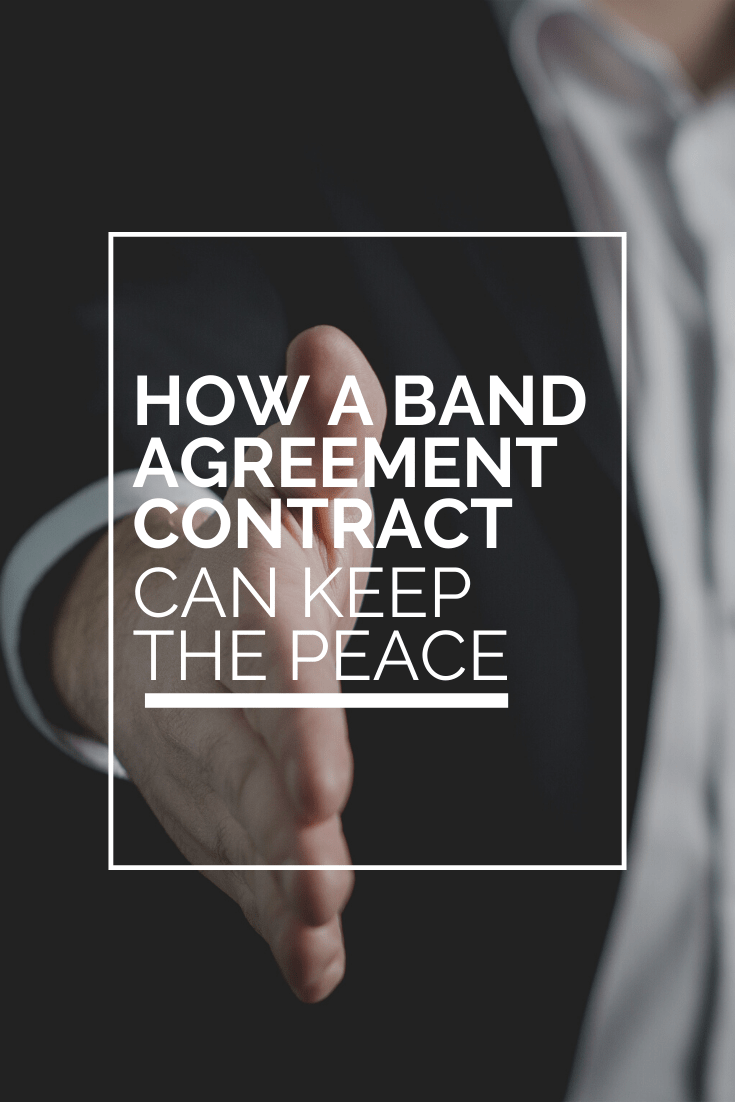A Band Agreement (Contract) Can Keep the Peace

You’ve all heard horror stories of bands melting down, blowing up, and never playing with each other again. From the Beatles to Guns N’ Roses, there will always be differences when a creative group of individuals forms a band.
It’s a smart, long-term play to hash out an agreement before the band starts generating income. In the music business, it’s called a Band Member Contract. Think of it as a prenuptial agreement for bands. The contract protects everyone involved. Creative differences and financial matters can quickly spin out of control without a signed agreement upfront.
This blog will cover why you need a band agreement (aka contract) and what it should contain.
NOTE: A band agreement covers the musicians in the band. If you're looking for the type of contract between bands and their clients, check out Why Your Band Should Use An Artist Performance Contract.
When is a Band Agreement Necessary?
If you play in a hobby or garage band just for fun and don’t plan on making much money, you probably don’t need a band agreement. Text or email messages between everyone should be enough.
However, If the band’s goal is to make it big and go full-time, you need to come together and make a mutually agreeable contract. When the band starts generating income, the band member contract is necessary to ensure the band’s members get an appropriate piece of the pie. A band agreement will protect everyone’s rights, entitlement, and livelihood, especially if your album goes platinum.
Three Reasons to Make a Band Member Agreement
It’s hard for creative people to think about contracts, clauses, and splitting up money. Unfortunately, many bands self-destructed because they didn’t think about these issues until after they became successful. Disagreements involving financial matters tore them apart.
If you think money comes second to music and art, here’s what Gene Simmons of Kiss has to say.
“I would urge all bands that say they only care about credibility and don’t care about money, to send Gene Simmons every dollar that they don’t want. I’d be happy to take it off them.”
A band is a for-profit business, and you need to treat it as such. There are three areas to consider when negotiating an agreement with your fellow band members.
1) Band Member Accountability
A band agreement puts in writing who does what. It answers questions like:
- Who owns the compositions and the master recording rights?
- Who owns the band’s name?
- What happens if a member leaves the band?
- How does the band make a final decision? Is it a majority vote or unanimous decision?
- Does the band own the equipment, or do individual members?
- Which member(s) can sign contracts and cheques on behalf of the band?
- Who can hire or fire members?
All of these issues are all likely to occur in the life of your band. You need to settle these matters early on.
2) Royalties and Revenue
It’s good to think big, like going on a 20-gig international tour. But you have to think smart. How will the band divide the revenue from touring, record sales, merch sales, publishing revenue, and any other sources?
Agreeing in advance how the pie gets sliced will reduce animosity and keep everyone happy.
3) Paying the Debts
With most new bands, there are one or two primary debt holders covering expenses until the band can cover them. Decide upfront how the debts get paid if the band breaks up, or a member quits. What do you do about jointly owned equipment?
If you are the one holding the debt, protect yourself with a band member agreement. At least you’ll have something in writing should you need to go to court.
Treat Your Bandmates Like Family, but Your Band Like a Business
Your band is like family, and you may feel uncomfortable talking about money and the expenses. To help your group start the conversation, here is a Band Partnership Fact Sheet and a Band Partnership Checklist from the Australian Music Industry Network.
It covers all the key topics, including:
- The band’s legal structure
- Commencement date and term of the contract
- Band names
- Finances and assets
- Members issues
- Income splits
- Settling disputes
A band member agreement protects everybody from unknown events that can happen in the future.
Without a written contract, it becomes a “he said/she said” argument. It is often impossible to prove what was said months or years before.
Another critical reason to get it in writing is when other people get involved with the band. For example, if the group, or a member, acquires a new manager, you can avoid the “I didn’t know, so it doesn’t apply to me” argument. The contract will guide everyone’s decisions.
The bottom line is to avoid messy disputes as you grow. Insist on a band member contract for a healthy relationship.
Consider this blog post for your reference and guideline only. You should consult an attorney who understands entertainment law for any legal principles. Never sign an agreement that has not been reviewed and blessed by your attorney.













